Sometimes referred to as canvas work, needlepoint is a type of embroidery that dates back to the ancient Egyptians. Traditionally done by stitching wool yarn through a stiff even weave canvas, the craft these days uses different types of thread—from silk and cotton yarns to ribbons and metallic cords—to create different textures.
Though it can sometimes be confused with cross stitch, needlepoint has a wide variety of stitches, as opposed to the single stitch used by cross stitchers. Different stitches can be used depending on the coverage needed and how durable the final piece needs to be.
Durability is often key, as needlepoint came into wide popularity during the 17th century when upholstered furniture became fashionable—in fact, it’s remained in use ever since, as it’s still used for household items like pillows today. These days, needlepoint is often used to decorate accessories like belts, purses, keychains, jewelry, and eyeglass cases in addition to wall hangings. The final result is like a tapestry but done with a needle instead of a loom.
Just as hand embroidery is making a comeback, more and more people are finding needlepoint a relaxed and satisfying outlet for their creativity. Let’s look at all the things you need to know to give the ancient craft a try for yourself.
Now that you know a little about needlepoint, learn about the supplies you’ll need, basic stitches, and kits to get you started with the craft.
Types of Needlepoint
View this post on Instagram
Within needlepoint, there are a few subcategories. These are based on the number of holes per inch in the canvas. Petit point is needlepoint done on a small scale, typically on canvas with 16 to 20 mesh holes per inch. This type of needlepoint uses a tent stitch on silk gauze and was very popular in the 18th century.
If the canvas has between eight and 16 squares per inch, it’s called gros point, while canvas with fewer than seven holes per inch is called quick point. The important thing to remember is that the more holes per square inch, the more detailed—and time-consuming—your design will be.
Essential Needlepoint Supplies
Canvas — Canvases can be hand-painted with a design, which can then be used as a guide for stitching. Alternatively, they can be left blank for freestyle needlepoint or used with a pattern for counted stitches. The canvas comes in a variety of stiffnesses and colors. Plastic canvas is great for beginners who are looking to practice their stitches, while mono canvas is perfect for hand-painted projects.
Yarn — Wool yarn is the traditional thread of choice for needlepoint, though silk yarn is frequently used in contemporary needlepoint. For small petit point projects, crewel yarns are often used. This fine wool is perfect for the detail needed and can also be great for blending. Persian yarn is the most common thread used. Paternayan is a popular brand. It can be purchased in hundreds of colors and is 3-ply, which means it can be separated to the thickness desired. Tapestry yarn, which cannot be separated, is thick and gives great coverage when working in gros point.
Needles — Additionally, you’ll need to purchase tapestry needles (which have blunt ends) and something to secure your canvas. Needlepoint isn’t typically stretched in hoops like other types of hand embroidery, due to the size and stiffness of the canvas. It’s more common to use stretcher bars or scroll frames and even lap stands for large projects.
Basic Needlepoint Stitches
While there are over 150 needlepoint stitches, most are variations on a few basic stitches—a long stitch that covers more than one square or a tent stitch that covers one intersection of threads. In fact, many beginners to needlepoint can get fantastic results using just three variations of the tent stitch. We’ll take a look at each basic stitch, but if you are looking for advanced techniques, watch this YouTube playlist by Sarah Homfray Embroidery or pick up the Plastic Canvas Stitch Dictionary.
Half Stitch
This simple stitch will be familiar to cross-stitchers, as it’s one-half of the X used in that technique. The half stitch moves from the bottom left to the top right of each square and is best used for small areas in one color. While the half stitch doesn’t use a lot of yarn, it also doesn’t provide great coverage. But, as it’s one of the easiest stitches to learn, it can be a good starting point for beginners.
Continental Stitch
The continental stitch provides great coverage and is the most used of the basic tent stitches. As it can distort the canvas, it’s best not to use it for large open areas, but rather for outlines, details, and small background areas. The continental stitch is very durable and your resulting needlepoint should last a lifetime when it’s used. How do you create a continental stitch? Watch the video below for a demonstration.
Basketweave Stitch
This tent stitch moves in diagonal rows up and down the canvas and is used for large coverage areas because it distorts the canvas the least. It also provides great stability thanks to the alternating warp and weft threads it lays over. Watch this tutorial to see how to make the perfect basketweave stitch to firm up your needlepoint.
Needlepoint Kits
Now that you have your basic stitches down, here are some needlepoint kits to help you start your next project.
Art Deco Style Needlepoint Kit
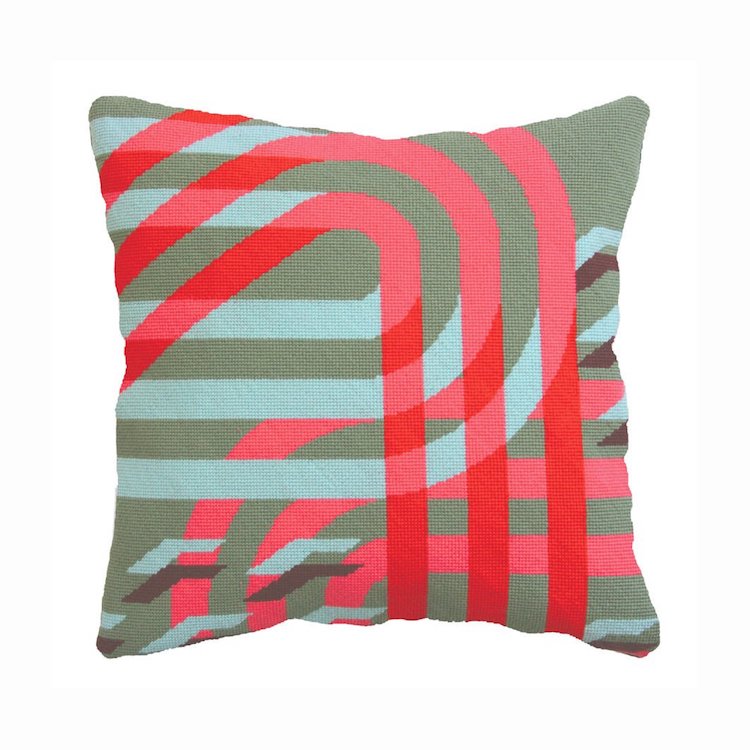
pompomkits | $159.48
Leopard Print Needlepoint Kits

Fresh Magpie | $64
Bothered Banana Banner

Stitchy Sailor | $29
Letter “E” Needlepoint Kit
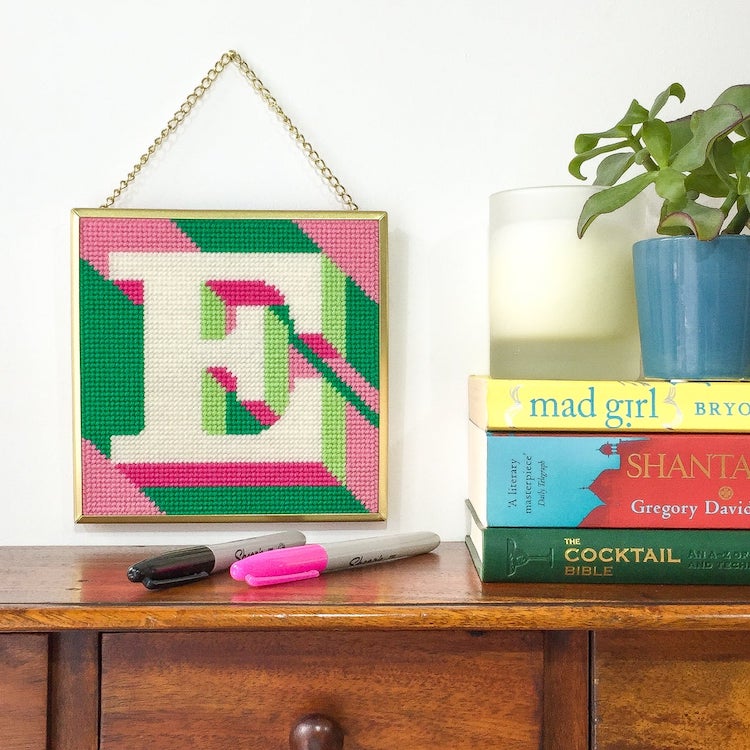
Han Bass Needlepoint | $29.46
DIY Needlepoint Pendant
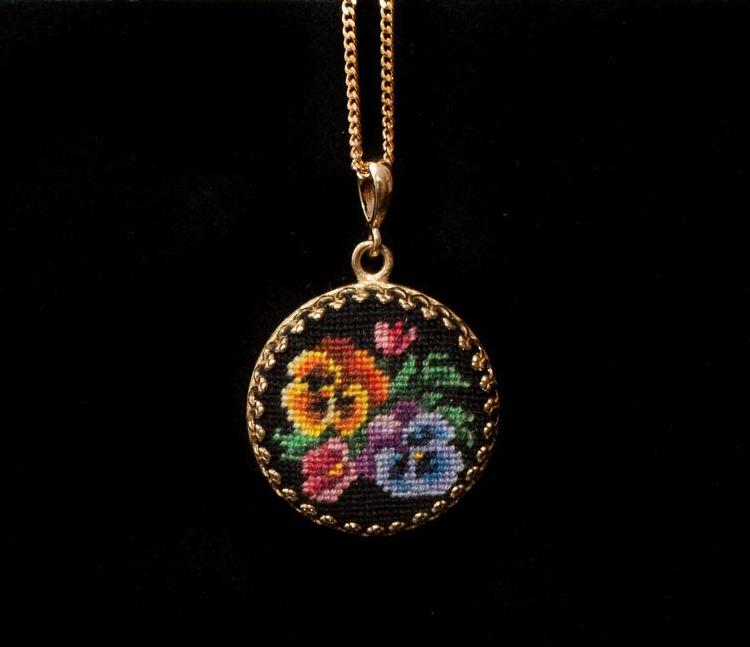
PinchukARTStudio | $25
Bargello Pin Cushion Kit
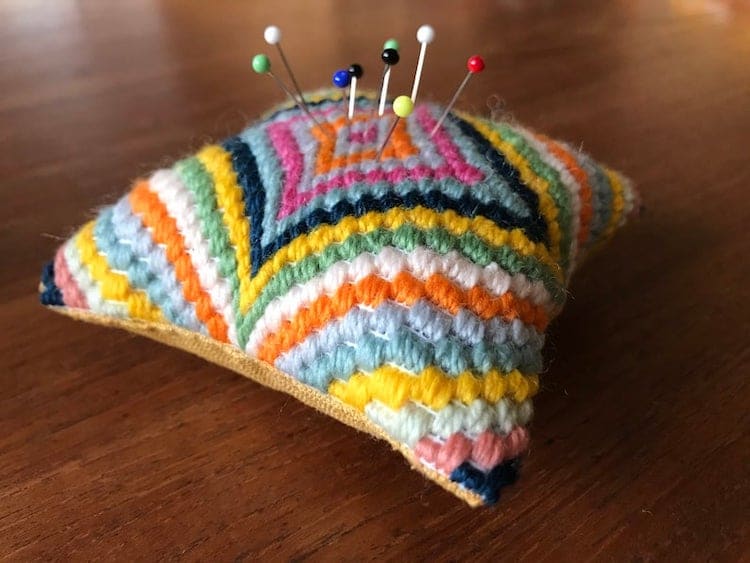
Pippin Kits | $22.15
DIY Floral Leaves Cushion
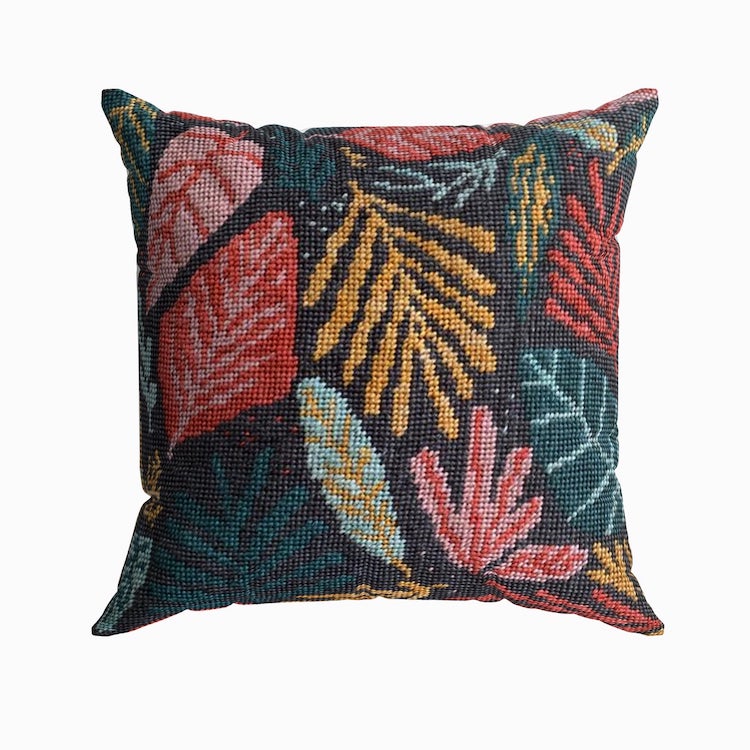
Byalma Designs | $40+
Modern Needlepoint Handpainted Canvas Kit
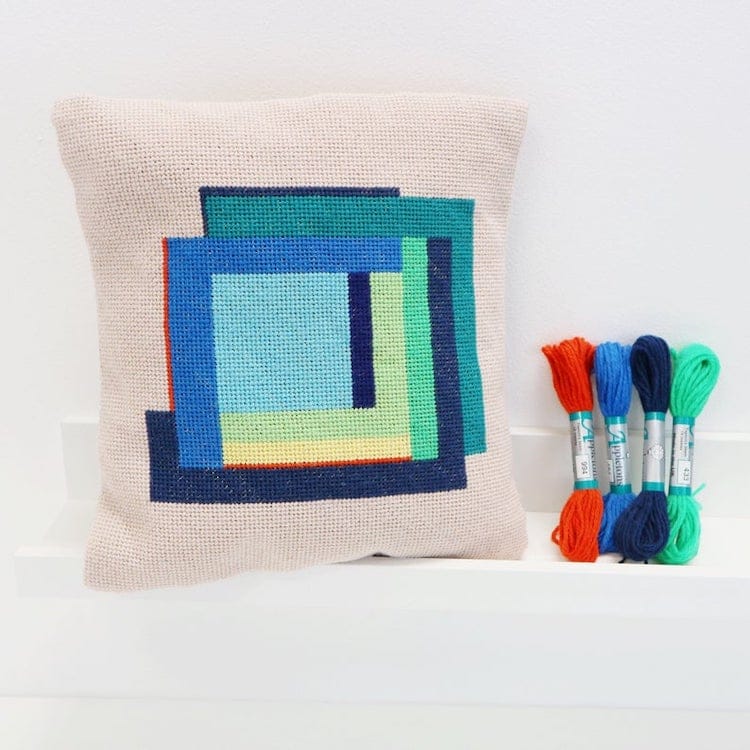
Stitch Kits | $108.79
Fly Tapestry Kit
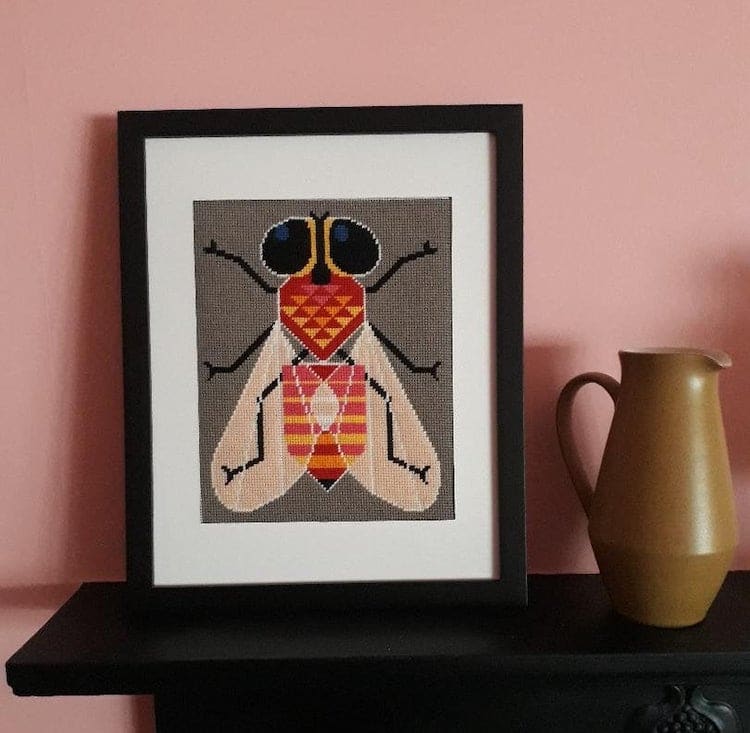
Emily Peacock Tapestry | $34.43
Geometric Twist Needlepoint Pillow Kit
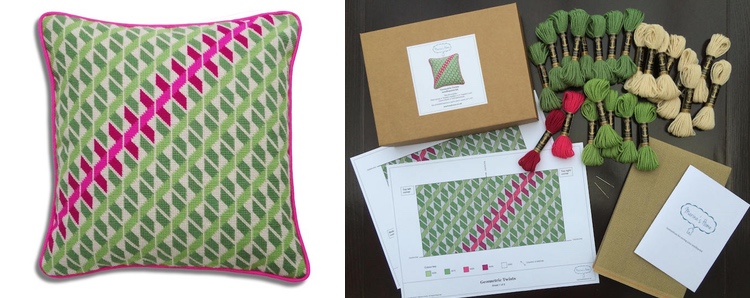
Marinas Home | $72.98
Lotus Needlepoint Pillow

Stitchery Dot Shop | $25.49+
Stitch and Zip Coin Case
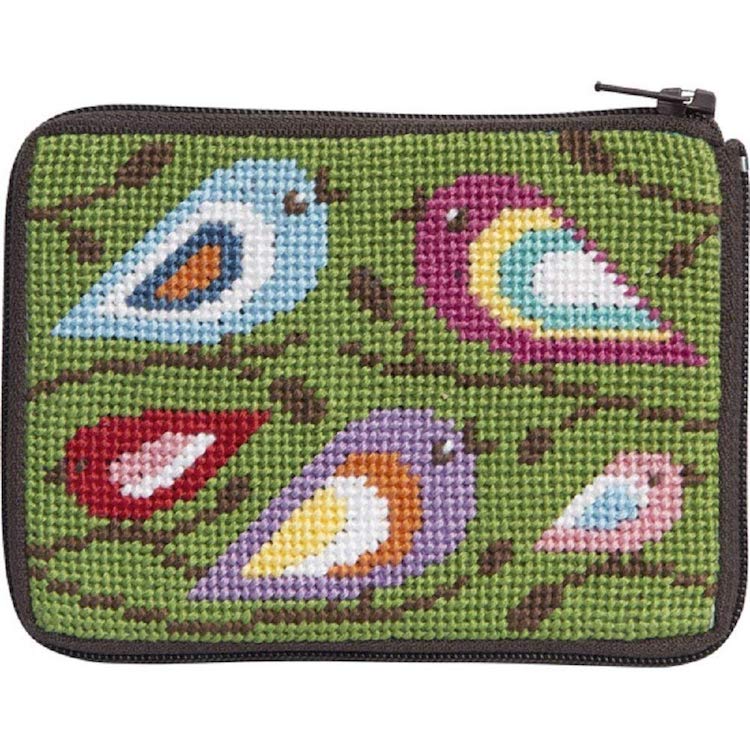
Alice Peterson | $15.23
“Peru” Needlepoint Pillow Kit

Stitchery Dot Shop | $25.49+
Contemporary Needlepoint
If you think that needlepoint is for your grandmother, think again. These contemporary needlepoint artists are showing just how creative they can get with this traditional technique.
View this post on Instagram
This post may contain affiliate links. If you make a purchase, My Modern Met may earn an affiliate commission. Please read our disclosure for more info.
This article has been edited and updated.
Related Articles:
10+ Most Popular Embroidery Stitches You Can Learn for Free on YouTube
Stylish Supplies and Cute Kits Perfect for Starting Embroidery
How to Make Your Own Free Embroidery Pattern (and Download Others for Free)
Nature-Inspired Embroideries Turn Wooden Bags Into Wearable Works of Art
